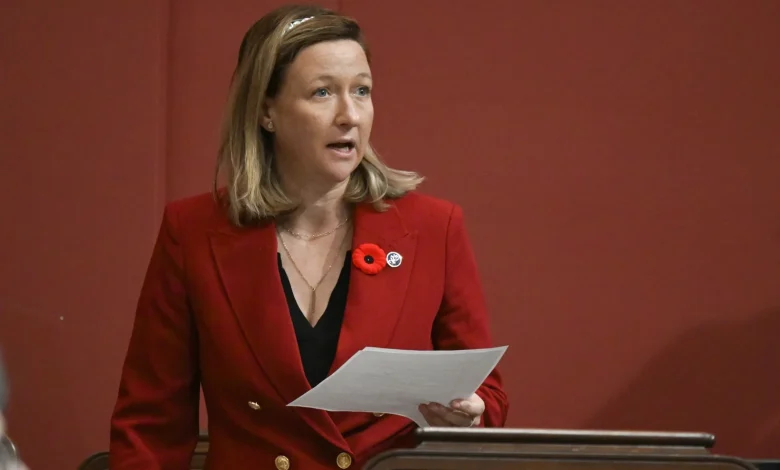Maïté Blanchette Vézina pourrait faire entrer le Parti conservateur du Québec au Parlement

Bien qu’elle dise ne pas être encore prête à porter les couleurs du Parti conservateur du Québec (PCQ), l’ex-députée caquiste Maïté Blanchette Vézina pourrait déposer des projets de loi pour le parti d’Éric Duhaime, en plus de lui donner accès au Parlement.
À un an des élections, le chef conservateur a trouvé une brèche pour obtenir plus de visibilité à l’Assemblée nationale. Comme l’a d’abord rapporté Le Journal de Québec, Maïté Blanchette Vézina discute actuellement avec M. Duhaime pour établir les dispositions d’une future collaboration.
En entrevue avec Le Devoir, la députée de Rimouski, qui a claqué la porte du caucus de la Coalition avenir Québec (CAQ) en septembre, a indiqué être animée par certaines « valeurs conservatrices ». Elle pourrait donc déposer des projets de loi écrits par le Parti conservateur « dans la mesure où ça rejoint [ses] valeurs ».
« Tu sais, je ne déposerai pas quelque chose qui ne me [correspond pas] », a précisé l’ancienne ministre des Ressources naturelles et des Forêts.
Sous la bannière conservatrice en 2026 ?
Maïté Blanchette Vézina estime être « au stade d’exploration » de sa relation professionnelle avec Éric Duhaime. « Je ne suis pas rendue à me dire que je vais me présenter au Parti conservateur », a-t-elle assuré.
La députée désormais indépendante s’est engagée à le rester d’ici 2026. Elle n’a cependant jamais exclu la possibilité de se présenter aux élections sous une nouvelle bannière en 2026 et ne ferme donc pas la porte à un jour porter les couleurs du parti d’Éric Duhaime.
Cette semaine, elle était d’ailleurs aux côtés du chef du PCQ quand il a demandé, au même titre que Québec solidaire, une réforme du mode de scrutin à l’Assemblée nationale. Le mois dernier, M. Duhaime et Mme Blanchette Vézina s’étaient rencontrés en personne pour la première fois, échange au terme duquel le chef conservateur avait publié sur X une photo d’eux deux. « J’ai beaucoup apprécié son aplomb lorsqu’elle a récemment annoncé qu’elle quittait la CAQ. »
Elle trouve d’ailleurs injuste que les 530 000 votes conservateurs récoltés en 2022 n’aient pas contribué à l’élection d’au moins un député. « Ces 500 000 personnes-là ne sont pas représentées à l’Assemblée nationale. [Ça] m’interpelle comme personne qui croit en la démocratie », a-t-elle dit au Devoir.
En discutant avec Éric Duhaime, Mme Blanchette Vézina a trouvé chez lui une « volonté de travailler [pour] les régions [qui l’]interpelle ».
« J’ai certaines valeurs conservatrices, et je le sais. Dans la décentralisation, notamment », a-t-elle souligné au Devoir. « Souvent, l’État prend beaucoup de place — trop — dans notre société. »
L’élue compte cependant consulter le programme du PCQ avant de décider si elle se joindra ou non à la formation politique de droite. « Je n’ai pas assez d’informations sur le programme du parti pour dire que c’est des valeurs qui me rejoignent », a-t-elle convenu.
Sur les réseaux sociaux, en début de soirée, le député du Parti québécois Pascal Bérubé a invectivé Mme Blanchette Vézina. « N’importe quoi », a-t-il écrit. « Le Parti conservateur du Québec a fait 4,8 % dans Rimouski en 2022. Aucune légitimité de la députée de détourner son mandat pour devenir la nouvelle Claire Samson du PCQ. »
Contactée jeudi, l’équipe d’Éric Duhaime a réservé ses commentaires. Avant les élections de 2022, le chef conservateur avait pu accéder au Parlement lorsque la députée Claire Samson avait troqué son uniforme caquiste pour enfiler les couleurs conservatrices.
Mme Samson ne s’était toutefois pas présentée aux élections générales de 2022. C’est une caquiste, Audrey Bogemans, qui représente désormais son ancienne circonscription d’Iberville.





